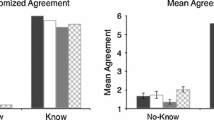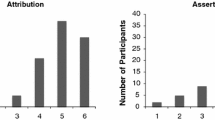Abstract
I accomplish two things in this paper. First I expose some important limitations of the contemporary literature on the norms of assertion and in the process illuminate a host of new directions and forms that an account of assertional norms might take. Second I leverage those insights to suggest a new account of the relationship between knowledge and assertion, which arguably outperforms the standard knowledge account.
Similar content being viewed by others
Notes
I don’t wish to debate the decision to use the label ‘simple’ for these accounts, even though, as will be evident to the reader soon enough, so-called simple accounts carry a surprising number of theoretical commitments. Using ‘simple’ to label views that share the ten features discussed below is largely a matter of deference to the way the literature has unfolded to this point, including most obviously Williamson’s decision to classify his own account and some main competitors as ‘simple’. If we wish, instead of ‘simple’ we could say ‘purportedly simple’ or ‘orthodox’ or some such. It makes no substantive difference.
Williamson (2000, p. 241) says, ‘one must: assert p only if p has C’, but I prefer ‘may’ for permission and ‘S’ as a mnemonic for ‘simple’. Elsewhere Williamson uses ‘if and only if’ instead of ‘only if’ (e.g. 2000, p. 265). We could distinguish, then, between weak and strong Simple Schemas: weak schemas state only a necessary condition, whereas strong schemas state necessary and sufficient conditions. I won’t dwell on the distinction, since it isn’t pertinent to my present goals. For simplicity, in the main text I restrict myself to weak schemas.
More literally after the manner of the Simple Schema, but less naturally: you may assert Q only if Q is reasonable for you to believe. The rules that follow are likewise stated more naturally, although they could be brought strictly into Simple Schematic form.
Turri (2011a) also hints at an openness to Extrinsic.
Such an account is thus not only ex post facto but also aschematic, because it deviates from the Simple Schema. But not all ex post facto accounts are aschematic. For instance consider the Immediate Retraction Account, which endorses the follow rule: you may assert P only if you then immediately retract P. (Of course this account is implausible, but that’s beside the point.) Similarly not all dialectical accounts are purely ex post facto accounts. For instance, on Rescorla’s (2009, p. 100) reading, Brandom (1994) advocates a mixed account, which also accepts a concurrent restriction on assertion, to the effect that you may assert P only if you have sufficient warrant to believe P. On this interpretation, Brandom accepts Ex Post Facto and Plurality.
A third, more controversial type of example involves non-Gettiered justified true beliefs, which supposedly nevertheless fall short of knowledge because the subject’s justification isn’t strong enough to yield knowledge. This class of cases includes lottery propositions, as well as predictions and retrodictions based on evidence recognized to be incomplete or otherwise insufficient for knowledge. See Weiner and 2005. Williamson (2000, p. 246 ff.) takes the standard reaction to assertions in lottery cases to favor his simple knowledge account. I view lottery cases more ambivalently; see Turri (2011e) and Turri and Friedman (2013).
For those who don’t share the intuition about the case as described: adjust the case by increasing the older woman’s ticket number just enough until you feel it would no longer be wrong for you to refuse.
If one is impressed by Lackey’s cases of “selfless assertion,” then it is harmless to substitute here ‘you may assert Q only if it is reasonable for you to believe Q’. (For reasons to not be impressed by cases of selfless assertion, see Turri 2013a; relatedly, see Buckwalter et al. 2013, and Buckwalter and Turri 2013.) Also, I should note that the motivation for this second claim is two-fold. On the one hand, it is the most popular competitor to the simple knowledge account in the literature, and I am interested here in accommodating the intuitions of those who favor such a view. On the other hand, it is required in order for reasonable ignorant assertions to be suberogatory, on the standard definition of that normative category (as reflected in the first of the four claims from which my hypothesis follows). (Thanks to an anonymous referee for pointing out the need for further explanation here.)
The analogous express rule would be ‘you well assert that Q only if your assertion expresses your knowledge that Q’. I favor the express formulation but won’t pursue the matter further here.
For one account of the sort of normativity or value at stake here, see Turri (2013f).
I thank an anonymous referee for suggesting that I clarify that I’m not proposing that non-knowledgeable assertions are ethically bad, and for suggesting the analogy with permitted but bad moves in games.
To the extent there is a problem, that is. I’m willing to grant for the sake of argument that there is a problem here. For those to whom it seems that these ignorant assertions are impermissible, such cases will seem like counterexamples to the PA knowledge account, and there will be little if any motivation to abandon the simple account. It’s often assumed that the intuition is widely shared that reasonable ignorant assertions are permissible. But empirical investigation casts serious doubt on that assumption; see Turri (2013e).
References
Bach, K. (2008). Applying pragmatics to epistemology. Philosophical Issues, 18, 68–88.
Bach, K., & Harnish, R. M. (1979). Linguistic communication and speech acts. Cambridge, MA: MIT Press.
Benton, M. (2011). Two more for the knowledge account of assertion. Analysis. doi:10.1093/analys/anr085.
Benton, M. (2013). Dubious objections from iterated conjunctions. Philosophical Studies, 162(2), 355–358.
Brandom, R. (1994). Making it explicit. Cambridge, MA: Harvard University Press.
Buckwalter, W. (2013). Factive verbs and protagonist projection (under review).
Buckwalter, W, & Turri, J. (2013). In the thick of moral motivation (under review).
Buckwalter, W., David, R., & Turri, J. (2013). Belief through thick and thin (under review).
Chisholm, R. (1963). Supererogation and offence: A conceptual scheme for ethics. Ratio, 5(1), 1–14.
DeRose, K. (2002). Assertion, knowledge, and context. Philosophical Review, 111(2), 167–203.
Douven, I. (2006). Assertion, knowledge, and rational credibility. Philosophical Review, 115(4), 449–485.
Driver, J. (1992). The suberogatory. Australasian Journal of Philosophy, 70(3), 286–295.
Hawthorne, J. (2004). Knowledge and lotteries. Oxford: Oxford University Press.
Hazlett, A. (2010). The myth of factive verbs. Philosophy and Phenomenological Research, 80(3), 497–522.
Hetherington, S. (1998). Actually knowing. The Philosophical Quarterly, 48(193), 453–469.
Hetherington, S. (1999). Knowing failably. The Journal of Philosophy, 96(11), 565–587.
Hill, C. S., & Schechter, J. (2007). Hawthorne’s lottery puzzle and the nature of belief. Philosophical Issues, 17, 102–122.
Kvanvig, J. L. (2009). Assertion, knowledge, and lotteries. In D. Pritchard & P. Greenough (Eds.), Williamson on knowledge (pp. 140–160). Oxford: Oxford University Press.
Lackey, J. (2007). Norms of assertion. Noûs, 41(4), 594–626.
McKinnon, R., & Turri, J. (2013). Irksome assertions. Philosophical Studies (Forthcoming).
Pelling, C. (2011). A self-referential paradox for the truth account of assertion. Analysis. doi:10.1093/analys/anr093.
Pelling, C. (2012). Paradox and the knowledge account of assertion. Erkenntnis. doi:10.1007/s10670-012-9360-0.
Rescorla, M. (2009). Assertion and its constitutive norms. Philosophy and Phenomenological Research, 79(1), 98–130.
Sosa, D. (2009). Dubious assertions. Philosophical Studies, 146(2), 269–272.
Stanley, J. (2008). Knowledge and certainty. Philosophical Issues, 18, 33–55.
Starmans, C., & Friedman, O. (2012). The folk conception of knowledge. Cognition, 124(3), 272–283.
Turri, J. (2010a). Epistemic invariantism and speech act contextualism. Philosophical Review, 119(1), 77–95.
Turri, J. (2010b). Prompting challenges. Analysis, 70(3), 456–462.
Turri, J. (2011a). The express knowledge account of assertion. Australasian Journal of Philosophy, 89(1), 37–45.
Turri, J. (2011b). Promises to keep: Speech acts and the value of reflective knowledge. Logos & Episteme, 2(3), 583–590.
Turri, J. (2011c). Mythology of the factive. Logos & Episteme, 2(1), 143–152.
Turri, J. (2011d). Manifest failure: The gettier problem solved. Philosophers’ Imprint, 11(8), 1–11.
Turri, J. (2011e). Contingent a priori knowledge. Philosophy and Phenomenological Research, 83(2), 327–344.
Turri, J. (2012a). Pyrrhonian skepticism meets speech–act theory. International Journal for the Study of Skepticism, 2, 83–98.
Turri, J. (2012b). Is knowledge justified true belief? Synthese, 184(3), 247–259.
Turri, J. (2012c). Preempting paradox. Logos & Episteme, 3(4), 659–662.
Turri, J. (2013a). You gotta believe. In C. Littlejohn & J. Turri (Eds.), Epistemic norms. Oxford: Oxford University Press (forthcoming).
Turri, J. (2013b). A conspicuous art: Putting gettier to the test. Philosophers’ Imprint (forthcoming).
Turri, J. (2013c). Linguistic intuitions in context: A defense of nonskeptical pure invariantism.” In A. Booth & D. Rowbottom (Eds.), Intuitions. Oxford: Oxford University Press (forthcoming).
Turri, J. (2013d). Knowledge as achievement, more or less. In M. F. Vargas (Ed.), The present and future of virtue epistemology (forthcoming).
Turri, J. (2013e). The test of truth: an experimental investigation of the norm of assertion (under review).
Turri, J. (2013f). Sustaining rules: A model and application (under review).
Turri, J, & Friedman, O. (2013) Winners and losers in the folk epistemology of lotteries. In J. Beebe (Ed.), Advances in experimental epistemology. London: Continuum (forthcoming).
Unger, P. (1975). Ignorance: A case for skepticism. Oxford: Oxford University Press.
Weatherson, B. (2003). What good are counterexamples? Philosophical Studies, 11(1), 1–31.
Weiner, M. (2005). Must we know what we say? Philosophical Review, 114(2), 227–251.
Williamson, T. (1996). Knowing and asserting. Philosophical Review, 105(4), 489–523.
Williamson, T. (2000). Knowledge and its limits. Oxford: Oxford University Press.
Acknowledgments
For helpful feedback and conversation, I thank an anonymous referee for Philosophical Studies, Matt Benton, Mathieu Doucet, Tim Kenyon, Patricia Marino, Rachel McKinnon, Ernest Sosa, and Angelo Turri. Thanks also to audiences at Ryerson University, the 2012 Congress of the Canadian Philosophical Association, and the 2012 Orange Beach Epistemology Workshop. This research was kindly supported by the Social Sciences and Humanities Research Council of Canada, the British Academy, the Association of Commonwealth Universities, the National Endowment for the Humanities, The Character Project at Wake Forest University and the John Templeton Foundation (neither of which necessarily endorses any opinion expressed here), and an Ontario Early Researcher Award.
Author information
Authors and Affiliations
Corresponding author
Rights and permissions
About this article
Cite this article
Turri, J. Knowledge and suberogatory assertion. Philos Stud 167, 557–567 (2014). https://doi.org/10.1007/s11098-013-0112-z
Published:
Issue Date:
DOI: https://doi.org/10.1007/s11098-013-0112-z




